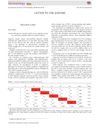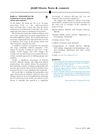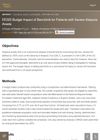 11 citations,
December 2018 in “Journal of the European Academy of Dermatology and Venereology”
11 citations,
December 2018 in “Journal of the European Academy of Dermatology and Venereology” Stopping JAK inhibitor treatment for hair loss can lead to worse hair loss than before the treatment.
5 citations,
April 2019 in “Journal of Nepal Health Research Council” People with Alopecia areata often have lower vitamin D levels, which may be linked to the severity of their condition.
 2 citations,
May 2018 in “Journal of the American Academy of Dermatology”
2 citations,
May 2018 in “Journal of the American Academy of Dermatology” Low vitamin D might be one of several factors involved in the hair loss condition alopecia areata.
 March 2022 in “Wound practice & research”
March 2022 in “Wound practice & research” New treatments for alopecia areata show promise, but standardized guidelines are needed.
 39 citations,
January 2019 in “Journal of the American Academy of Dermatology”
39 citations,
January 2019 in “Journal of the American Academy of Dermatology” Tofacitinib may help treat severe childhood alopecia areata, but risks require careful consideration.
 1 citations,
August 2019 in “Australasian journal of dermatology”
1 citations,
August 2019 in “Australasian journal of dermatology” Immunotherapy can help treat severe alopecia areata.
 March 2023 in “PARIPEX INDIAN JOURNAL OF RESEARCH”
March 2023 in “PARIPEX INDIAN JOURNAL OF RESEARCH” Tofacitinib helped regrow hair in most patients with severe hair loss.
 January 2018 in “Journal of the American Academy of Dermatology”
January 2018 in “Journal of the American Academy of Dermatology” More extensive trials are needed to understand tofacitinib's role in treating severe hair loss.
 66 citations,
December 2018 in “Dermatology”
66 citations,
December 2018 in “Dermatology” Both ruxolitinib and tofacitinib are effective and safe for treating severe alopecia areata, but relapses are common.
 44 citations,
October 2017 in “Journal of the American Academy of Dermatology”
44 citations,
October 2017 in “Journal of the American Academy of Dermatology” Tofacitinib is effective and safe for treating severe hair loss in Korean patients.
 25 citations,
November 2022 in “British journal of dermatology/British journal of dermatology, Supplement”
25 citations,
November 2022 in “British journal of dermatology/British journal of dermatology, Supplement” Baricitinib for severe alopecia areata is generally safe, with common side effects like infections and acne, and low rates of serious complications.
 23 citations,
September 2019 in “Journal of The American Academy of Dermatology”
23 citations,
September 2019 in “Journal of The American Academy of Dermatology” Tofacitinib and oral minoxidil together effectively regrow hair in severe alopecia areata patients.
 11 citations,
February 2021 in “Journal of Cosmetic Dermatology”
11 citations,
February 2021 in “Journal of Cosmetic Dermatology” Oral tofacitinib helped regrow hair in over half of the patients with severe alopecia, but relapses and side effects were common.
 1 citations,
October 2023 in “Dermatology and therapy”
1 citations,
October 2023 in “Dermatology and therapy” Some treatments for severe hair loss work but often have side effects, with baricitinib showing the most promise.
 August 2024 in “JAMA Dermatology”
August 2024 in “JAMA Dermatology” Continuous baricitinib is needed to keep hair regrowth in severe alopecia areata.
 23 citations,
September 2017 in “Journal of the American Academy of Dermatology”
23 citations,
September 2017 in “Journal of the American Academy of Dermatology” Apremilast did not work for treating severe alopecia areata.
 9 citations,
April 2018 in “Journal of Dermatological Treatment”
9 citations,
April 2018 in “Journal of Dermatological Treatment” Tofacitinib improves nail conditions in patients with severe hair loss and does not affect hair regrowth.
 June 2024 in “Dermatology and Therapy”
June 2024 in “Dermatology and Therapy” Baricitinib improves quality of life and reduces anxiety and depression in severe alopecia areata patients with hair regrowth.
 196 citations,
September 2016 in “JCI insight”
196 citations,
September 2016 in “JCI insight” Ruxolitinib effectively regrows hair in most patients with severe hair loss.
 20 citations,
January 2013 in “Evidence-based complementary and alternative medicine”
20 citations,
January 2013 in “Evidence-based complementary and alternative medicine” TGPC plus CGT is effective and safe for treating severe alopecia areata in children.
 4 citations,
July 2020 in “Journal of Dermatological Treatment”
4 citations,
July 2020 in “Journal of Dermatological Treatment” Minoxidil injections can speed up hair regrowth in non-severe patchy hair loss, but combining it with steroids doesn't improve results.
 March 2022 in “Nepal Journal of Dermatology Venereology & Leprology”
March 2022 in “Nepal Journal of Dermatology Venereology & Leprology” Methotrexate with steroids is slightly more effective than azathioprine with steroids for treating severe alopecia areata.
 May 2015 in “Journal of The American Academy of Dermatology”
May 2015 in “Journal of The American Academy of Dermatology” Both treatments help with hair regrowth in alopecia areata, but azathioprine has milder side effects than betamethasone.
 April 2024 in “Frontiers in medicine”
April 2024 in “Frontiers in medicine” Alopecia Areata significantly lowers quality of life and current treatments are inadequate, highlighting a need for better therapies and standardized treatment protocols.
 June 2022 in “Value in Health”
June 2022 in “Value in Health” Adding Baricitinib for severe alopecia areata will have a small impact on a health plan's budget.
 November 2023 in “Indian Dermatology Online Journal”
November 2023 in “Indian Dermatology Online Journal” Tofacitinib was effective for severe, treatment-resistant hair loss without side effects.
 1 citations,
August 2023 in “JAMA Dermatology”
1 citations,
August 2023 in “JAMA Dermatology” Increasing the dose of baricitinib to 4 mg helps more patients with severe alopecia areata regrow hair.
 January 2024 in “Skin Research and Technology”
January 2024 in “Skin Research and Technology” Oral tofacitinib may be an effective future treatment for children with severe alopecia areata, but more research is needed.
 78 citations,
March 2017 in “JAMA Dermatology”
78 citations,
March 2017 in “JAMA Dermatology” Tofacitinib helped regrow hair in people with severe alopecia, but side effects occurred and benefits stopped after treatment ended.
 40 citations,
September 2018 in “Journal of the American Academy of Dermatology”
40 citations,
September 2018 in “Journal of the American Academy of Dermatology” Tofacitinib helped some young children with severe hair loss grow their hair back without bad side effects.





























